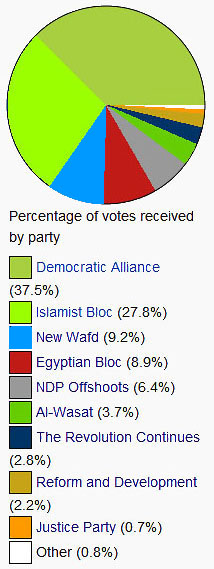 Dave Schuler makes a point about Egyptian politics that’s far from new, but perhaps deserves to be repeated a little more often than it is: most of the population of Egypt doesn’t want a secular government. It wants an Islamic government, as the election results from two years ago show:
Dave Schuler makes a point about Egyptian politics that’s far from new, but perhaps deserves to be repeated a little more often than it is: most of the population of Egypt doesn’t want a secular government. It wants an Islamic government, as the election results from two years ago show:
Of the parties listed above, the Democratic Alliance (parties allied with the Muslim Brotherhood—37.5%), the Islamist Bloc (Salafist parties even more radical than the DA—27.8%), and Al Wasat (3.7%) are all Islamist parties with an aggregate total of 69% of the vote….It’s possible that after the unpleasant experience with Morsi that public opinion may change, but in what direction? Most Egyptians are clearly not liberal democrats.
In my view the greatest likelihood is for either a return to the status quo ante, perhaps a kinder, gentler Mubarak or another Islamist government, a Morsi who isn’t Morsi. Societies depend on institutions and the two strongest institutions in Egypt are the military and the Muslim Brotherhood.
In Egypt, you can either have a secular government or you can have a democracy. You probably can’t have both.
UPDATE: Elizabeth Nugent summarizes Egyptian polling data, which paints pretty much the same picture:
Recent survey data suggests that the vast majority of Egyptians are Islamists….In April 2013, Pew released a report titled “The World’s Muslims: Religion, Politics, and Society,” which included a nationally representative sample of 1,798 Egyptians….74 percent favored making sharia the official law of their country….Of those who favored making sharia the law of the land, 70 percent wanted sharia to apply to both Muslims as well as non-Muslims….94 percent wanted religious judges (instead of civil courts) to decide family and property matters; 70 percent wanted corporal (hadd) punishments for crimes; 81 percent supported stoning as punishment for adultery; and 86 percent supported punishing those who converted from Islam with death….Arab barometer data collected in June 2011 also found that 80% of a 1200-person nationally representative sample of Egyptians agreed or strongly agreed with the statement, “The government and parliament should enact laws in accordance with Islamic law.”
More at the link.

















